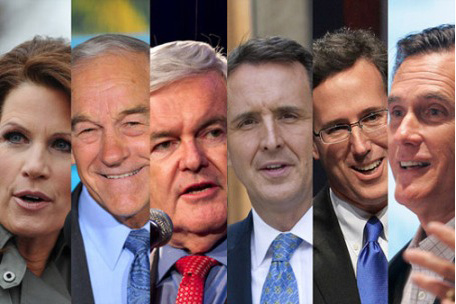Iran and U.S. Presidential Election

Today the U.S. presidential election in 2012 officially kicks off. People in the Midwest state of Iowa will go to the polls to choose the Republican contender for the November nation-wide election. Following Iowa, people of the Northeast state of New Hampshire will do the same and this process will go on in all states until the Republican Convention meets in the summer to choose the Republican nominee for the 2012 election. For the Democratic Party, a similar caucuses and primaries will be held, but it seems that the nominee in the Democratic Convention will be Barrack Obama.
As in other U.S. elections, domestic issues will dominate the November election. However, there are certain foreign issues about which Americans care when they want to elect their next president. Security-related issues such as Al-Qaeda terrorism are of importance to voters and knowing this fact, the candidates take tough stance against terrorism in order to gather more votes. There are other issues which are not a priority for ordinary Americans but, for political reasons, are made to seem important for them. To give an example, one can refer to the positions of most Republican candidates who have tried to present an unrealistic picture of Iran’s nuclear activities and the threats these activities pose to regional and international peace and security.
In Iowa, while a leading candidate, Representative Ron Paul has openly criticized a pre-emptive attack against Iran because “right now there are no signs they are seeking to build a bomb," the other candidates have said clearly that they would use force in the event the sanctions proved to be ineffective in preventing Iran from what they call building a nuclear weapon.
Although President Obama has been careful not to compete with Republicans on the question of the necessity of using force against Iran, his record in dealing with Iran in general and its nuclear issue, in particular, is not promising. Bearing in mind the need to score political points in this year's election, Obama has either taken initiatives to isolate Iran internationally or has succumbed to the decisions of the Congress related to tightening sanctions against Iran even if the world economy or U.S. allies are going to suffer as a result of these measures.
The latest sanction against the Central Bank of Iran, approved by the Congress and signed by the President on the last day of 2011, is a clear case of open hostility towards Iran where foreign financial institutions are penalized for doing business in the area of oil and gas with the Iranian Central Bank. Iran has considered this latest U.S. measure as an act of undeclared war on Iran's economy and has warned about negative consequences of blocking Iran's ability to export its oil.
The Persian Gulf area has witnessed unhealthy and unwarranted threats and counter-threats in the last few weeks. The release of the news of the U.S. arms sale worth tens of billions of dollars to Saudi Arabia and U.A.E. has added to the already tense situation in the area. Both President Obama and Republican candidates should understand that playing with the card of Iran in the election campaign is a big gamble which might produce undesirable consequences. Wise men from all sides are advised to lower their rhetoric and avoid threats and instead work towards solving the existing problems through peaceful means.

